Omega-6: Can It Help Ease Your Dog's Joint Pain?
The Role of Essential Fatty Acids in Joint Care

The Role of Essential Fatty Acids in Joint Care
Essential fatty acids are critical to a dog's health, particularly in supporting joint health and reducing inflammation. As dogs age, they often experience joint issues such as arthritis, leading many pet owners to seek natural options for relief. Fatty acids, particularly omega-6 and omega-3, are frequently recommended to improve joint health and flexibility, but their specific roles can sometimes be confusing.
This article explores how balanced fatty acids can contribute to joint comfort in dogs and explains why these nutrients are a significant ingredient in joint care supplements.
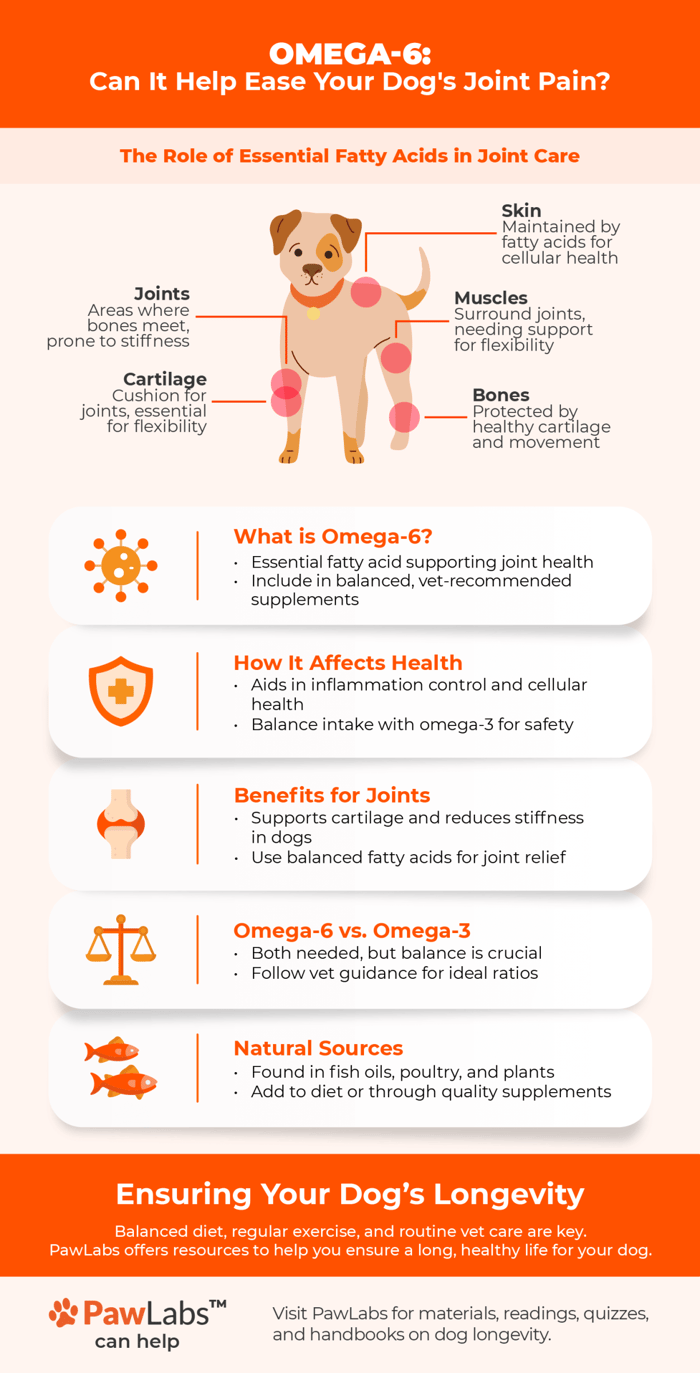
What Is Omega-6, and Why Is It Essential for Dogs?
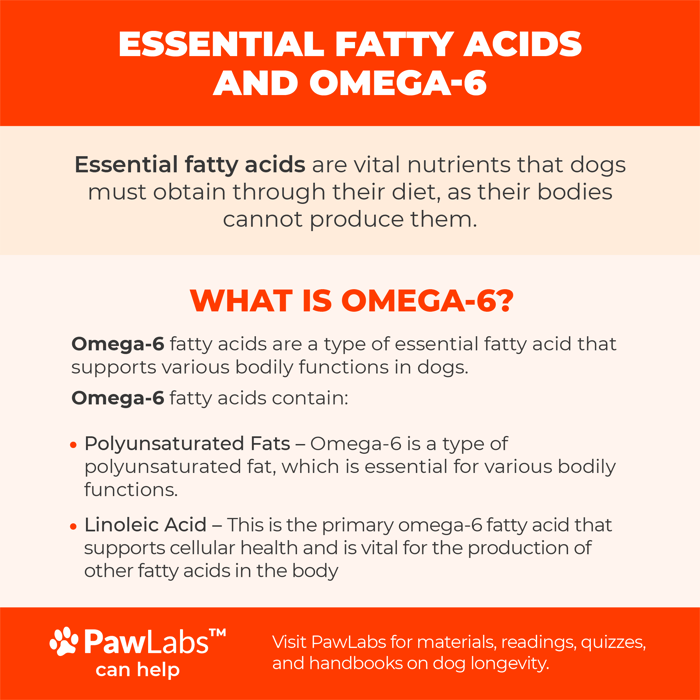
Omega-6 fatty acids play essential roles in cellular health, skin, and immune support for dogs. Because dogs cannot produce these on their own, they rely on dietary sources or supplements to maintain adequate levels. Found in polyunsaturated fats, it is particularly valued for its ability to support a healthy inflammatory response, helping to manage the body’s reaction to injury and strain.
Veterinary expert Dr. Christopher Frye highlights that “balanced omega-6 and omega-3 intake is essential for managing inflammation and cellular health" (Cornell University). Proper amounts can support canine health overall, but excess intake can lead to chronic inflammation, making a balanced approach essential.
How Does It Function Within a Dog’s Body?
In a dog’s body, omega-6 supports immune health, hormone production, and cellular integrity, promoting both healing and reducing occasional stiffness. This essential nutrient is also integral to joint maintenance, as it helps regulate inflammation, which is key for dogs prone to joint pain or arthritis.
Linoleic acid's benefits are enhanced when combined with omega-3, creating a balanced intake that promotes joint flexibility and reduces chronic inflammation. Fatty acids help maintain strong cellular structures, which is especially important as dogs get older.
What Role Do Fatty Acids Play in Joint Health?
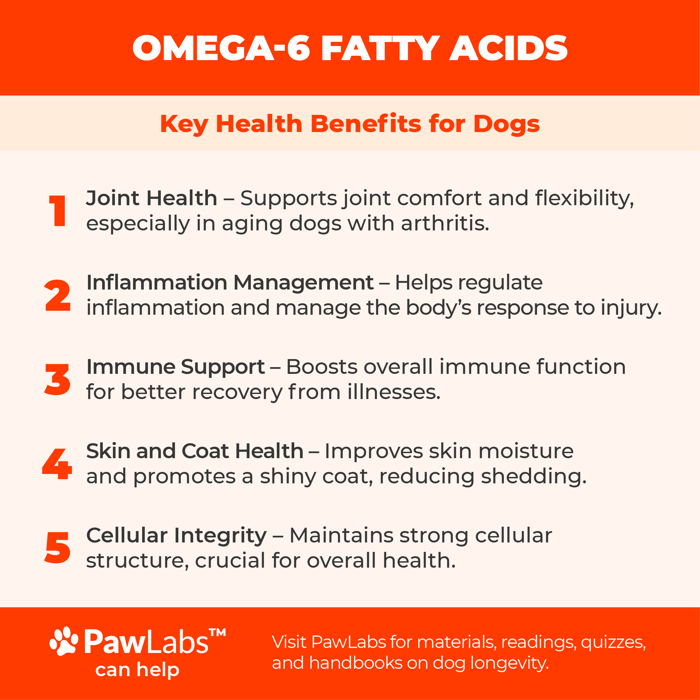
Fatty acids contribute to the structural health of cartilage, the tissue that cushions bones and reduces friction. Proper balance in these nutrients promotes joint comfort and supports flexibility, helping dogs maintain mobility as they age.
Simon Veterinary Surgical notes, “Balanced fatty acids, including omega-6, can lead to reduced stiffness and improve joint comfort in dogs with arthritis" (Simon Veterinary Surgical). This makes fatty acids an essential consideration in canine joint supplements that aim to support mobility and reduce discomfort.
Can Fatty Acids Actually Help Alleviate Joint Pain in Dogs?
Fatty acids, particularly when balanced with omega-3, can support joint health and ease discomfort in aging dogs. While omega-6 on its own is not a cure for joint issues, it can contribute to managing occasional stiffness and promoting comfort. Veterinarians recommend fatty acids as a part of a comprehensive approach to joint health, emphasizing their value in combination with other therapies.
Dr. Frye advises, "Balanced fatty acid intake can help manage arthritis symptoms and improve quality of life for dogs experiencing joint discomfort" (Cornell University). This combined approach enhances the benefits and supports dogs in remaining active.
How Do Omega-6 and Omega-3 Compare for Joint Care?
Omega-3 is known for its anti-inflammatory effects, which are highly beneficial in managing joint discomfort. However, it plays a complementary role by supporting cellular and immune health. The ideal approach is to balance these fatty acids, ensuring both contribute to healthy joint function.
Research suggests that while omega-3 may be more effective in directly reducing inflammation, omega-6 provides cellular support that helps joint supplements work more effectively. Experts emphasize the importance of a balanced intake to achieve optimal health results (Fido's Bowl).
Are There Risks or Side Effects for Dogs?
Like any supplement, fatty acids should be used in the right proportions. Excessive intake, particularly without balancing omega-3, can lead to an inflammatory state, worsening conditions like arthritis. Potential side effects include digestive issues or allergic reactions, which may arise if the dosage is too high.
Pet owners are advised to consult with a veterinarian before starting any supplements to ensure the dosage fits the dog's age and health needs (American Kennel Club).
What Are Some Natural Sources of Omega-6 for Dogs?
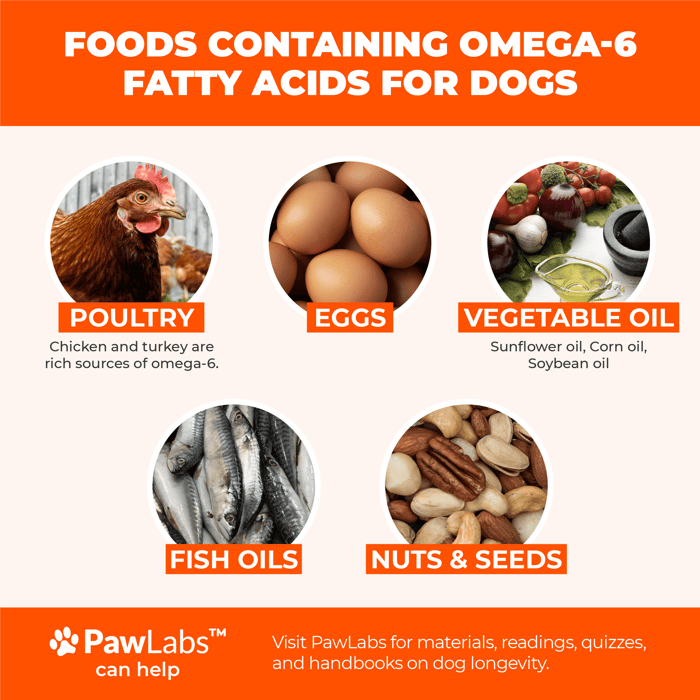
This essential fatty acid is available in many natural sources, such as poultry, eggs, and vegetable oils like sunflower oil. For those who prefer not to rely solely on dog food, fish oils provide a balanced supplement with various omega fatty acids.
These natural sources offer consistency and a safer approach for dogs with sensitive digestive systems. Consulting a veterinarian is still advisable to ensure a well-rounded diet that avoids excessive fatty acid intake.
How Much Should a Dog Receive in Their Diet?
A dog’s intake of fatty acids depends on their size, age, and health status. Generally, a balance of omega-6 to omega-3 in a ratio of around 5:1 is ideal for supporting joint health and managing inflammation. This balance optimizes the effectiveness of each fatty acid, avoiding chronic inflammation while promoting flexibility.
Veterinarians provide the best guidance on daily requirements, ensuring fatty acid intake aligns with the dog’s health needs and reducing the risk of side effects.
The Importance of Dog Longevity
Supporting a dog’s joint health is crucial to ensuring they enjoy a long, active life. Unaddressed joint issues can significantly reduce a dog’s quality of life as they age, impacting their mobility and comfort. By focusing on fatty acid intake alongside a balanced diet and exercise, pet owners can help prolong their dog’s active years.
Wild Alaskan Salmon Oil
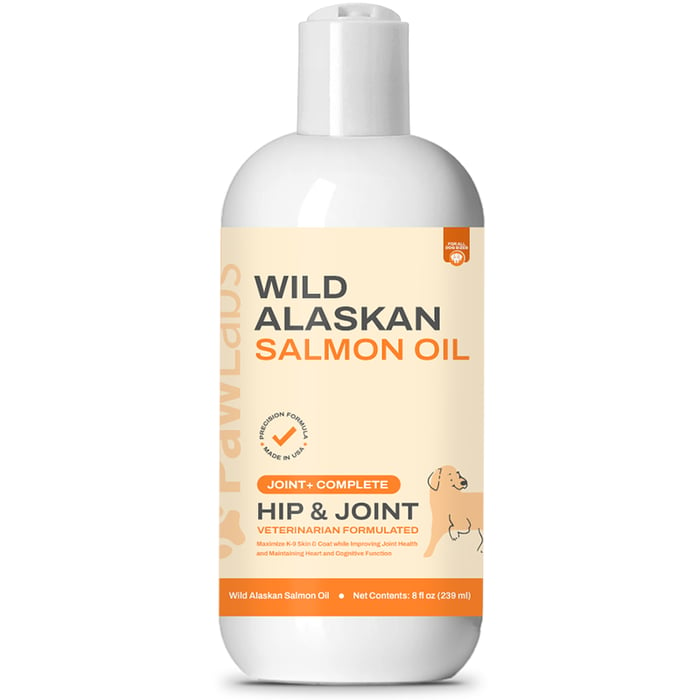
Wild Alaskan Salmon Oil stands out for its purity, high omega-3 and omega-6 content, and sustainable sourcing. Unlike farmed salmon, wild Alaskan salmon offer higher nutritional value and are free from contaminants and artificial additives. This ensures superior quality and health benefits for your dog.
Wild Alaskan Salmon Oil
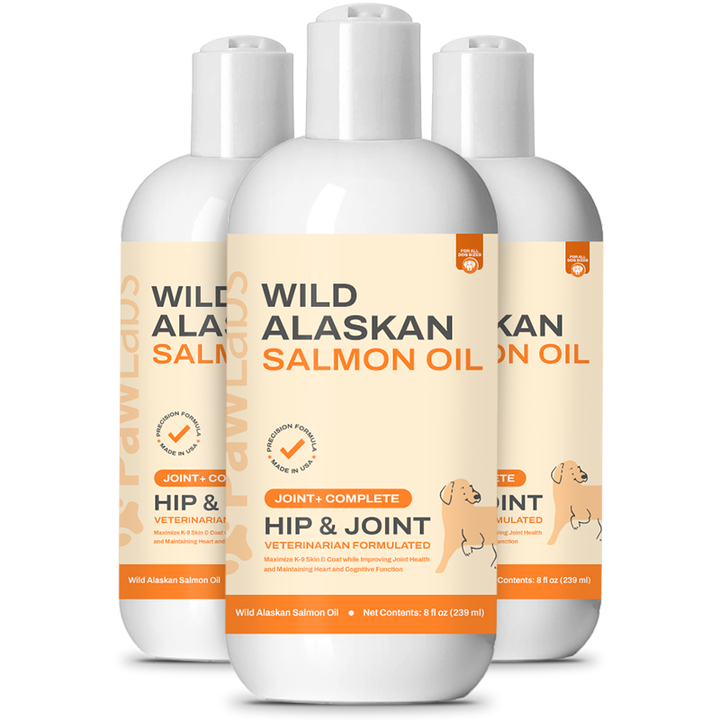
$24.95
$34.95
8 ESSENTIAL KEY NUTRIENTS: Omega-3 (EPA and DHA) Omega-6 Natural Vitamin D3 Essential B Vitamins Astaxanthin Biotin Selenium Iodine … read more
 SUCCESS!
SUCCESS!





